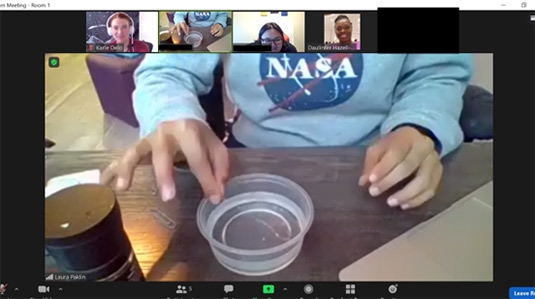
Nonprofit Innovation Hub: How the American Modeling Teachers Association adapted alongside the educators it serves

The American Modeling Teachers Association continued to support educators across the country during the pandemic as they faced new instructional challenges.
by Troy Hill, ASU Lodestar Center for Philanthropy and Nonprofit Innovation
August 11, 2021
It is well known that schools across the country and world had to close their doors as the coronavirus pandemic took hold. Less well known is how educational nonprofits were similarly devastated, with programs put on indefinite hold and budgets quickly drying up even as the educators they support needed help more than ever.
American Modeling Teachers Association (AMTA) is an educational nonprofit that easily could have been one of these organizations, but they managed to find a way to innovate and succeed through the pandemic.
AMTA focuses on training teachers the Modeling Instruction technique, a student-centered constructivist approach to learning science and STEM subjects that greatly aids teachers and students in the classroom.
This technique utilizes Socratic questioning, student-to-student discourse, whiteboarding and a focus on a true understanding of the subject matter being taught, not just a rough-enough understanding to answer some questions and pass a test. Research has shown that many students taught with the modeling technique outperformed students in traditional classrooms.
AMTA’s main programming is training workshops run by qualified leaders that take place in-person during the summer, which is the best time for teachers to participate. Unfortunately, the pandemic barred them from meeting in their normal way.
“Initially it was very scary. Obviously, like for most other people too, [it was] very uncertain,” said Bill Thornburgh, the executive officer for AMTA. “Workshops that were already scheduled to be face-to-face — they just kept getting canceled and canceled and canceled, understandably.“
But they had one large advantage — for the last few years, AMTA had been offering a few courses online.
“Our initial concern was that we don't want to offer something that's low quality. We didn't want to damage our reputation by just offering something ‘just because.’ So, this initial group got together, they discussed it and kind of decided, yeah, it's very possible. And here's how we could do it and they came up with some guidelines for leading virtual instruction.”They had a large meeting where the leaders with experience delivering virtual seminars came together to come up with ways to deliver high-quality professional development — or if it was even possible given the circumstances.

They started by offering just a few classes to test how things would go and they were very successful and well-received. They had to open up extra classes because the first few filled up so quickly.
Thornburgh said many teachers stepped up and still craved professional development despite the difficult times everyone went through.
Many teachers were also facing unique challenges that never could have been predicted before the last year, such as having to manage a virtual classroom. Fortunately, these spaces fostered opportunity for the participants to share experiences and produce ideas to accommodate the tough time. One might come forward with a problem, and chances were many other teachers had experienced the same. They would share what worked for some, what didn’t, and they could come up with ideas to move forward.
Thornburgh said the way AMTA was able to get through the difficult times was that they “were willing to adapt and be flexible with the circumstances.”
“We honestly just have a really, really dedicated and passionate group of leaders that were willing to go the extra mile, do the work, figure these things out.”
Early in the pandemic, AMTA leadership had many meetings just to figure out how to move forward and what the switch from in-person to virtual meetings would look like. It was especially difficult because certain parts of the workshop are difficult to replicate online, but they managed to find solutions.
“As I said, those key words: the dedication, the passion, the flexibility, adaptability of our organization, like the board members and the staff, as well as the leaders who who go out and do this every day.”
- In the news: Leadership collective to develop curriculum on racial justice
- ASU Lodestar Center receives Bank of America grant to train the next generation of nonprofit and civic leaders